Overtime by Will Stronge & Kyle Lewis
Written by Ashley Kelmore, Posted in What I'm Reading
Best for:
Workers.
In a nutshell:
Stronge and Lewis make a simple, elegant, and frankly pretty difficult to refute case for shortening the work week to four days or fewer.
Worth quoting:
[B]eing able to relax, spend time with loved ones, pursue self-directed activity and have freedom from a boss are all essential parts of what it means to be human. Time is life after all.”
Why I chose it:
Verso books had a sale 😀
Review:
When I really think about it, is is pretty absurd that as a society we’ve just sort of … accepted that we work five days (on average) and then get two days ‘off.’ Like, why on earth should someone else get to dictate what I do for more than 2/3 of my life? That’s so bizarre. And this is way better than before, where people maybe got Sundays off? Maybe? I know there are many people who work shifts and multiple jobs where they either don’t get two days off in a row, or those two days change regularly depending on schedules, but for many people, they work at least 40 hours spread across five days out of seven.
Seriously. That’s ridiculous.
Authors Stronge and Lewis lay out their argument in such a straightforward way. They provide a brief background of labor struggles for better working conditions, and capitalism’s obsession with productivity and growth. They also point out that any version of the world that comes after capitalism can’t just focus on who owns the means of production, but on the quality — and quantity — of the time workers are on the job. They then spend one chapter each on three main arguments: that shorter working hours are good for people to flourish; that shorter working hours honor the time of those who perform unpaid labor (usually women); and that shorter working week is better for the environment.
On the first point, it seems pretty obvious. The authors discuss how many people talk about art and other similar ‘leisure’ pursuits as frivolous and the domain of the wealthy, but they point out that this is because the rich are the ones who can afford to do that. Think about how much art — poetry, music, books, plays, everything — we’ve missed out on because someone who might have created wonderful art instead had to spend so much of their time ‘earning a living.’
(Also, yikes. That phrase is disturbing. No one should have to ‘earn’ a living. We all deserve to live.)
On the second point, the authors discuss how a shorter working week would allow for greater division of unpaid work in homes with men and women in them. So much of office working life is based on an old assumption that the workers would be men who would have women at home doing all things domestic. Many women have always worked, and yet whether working or not, women in a home with men and women still end up doing more of the care-taking labor. With a shorter work week, in a two-person home, they would have six free days each week instead of four. And those working more labor-intensive jobs already would also have more time to relax and recover.
Finally, the third point looks at how fewer working days can have a positive impact on the environment. In obvious ways like cutting commuting, but also in ways like reduced purchase of things like grab and go sandwiches at work or ready meals each evening because we’re all so overworked. I liked this argument as well because they focus a bit on different green new deals that have been put forward, and how if they don’t include a reduction in working weeks they aren’t doing all they can for the environment.
In the UK, there is a movement to try out four-day work weeks. My own partner has one, but he took a 20% pay cut for it; the broader movement suggests instead that we should be working fewer hours but for the same pay.
I don’t know if this is possible to achieve. But I think it is something that should be much higher up on the list of things workers are fighting for than it currently is.
Recommend to a Friend / Keep / Donate it / Toss it:
Keep

